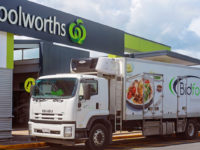 Supermarket giant Coles has reported sales growth of 3.1 per cent at its first half year results as an independently-listed company, but the costs of a restructure has had an impact on net profit, which dropped 14 per cent for the half year to $738 million.
Supermarket giant Coles has reported sales growth of 3.1 per cent at its first half year results as an independently-listed company, but the costs of a restructure has had an impact on net profit, which dropped 14 per cent for the half year to $738 million.
A $146 million pre-tax provision as part of a distribution network overhaul detailed by the retailer last month dragged profit down by 29 per cent on the same period a year earlier.
Half year group revenue rose by 2.0 per cent to $20.35 billion, with supermarket sales of $15.72 billion driven largely by the popular Little Shop campaign and improved in-store execution.
Coles chief executive Steven Cain said the results for the first half was a solid outcome in a challenging retail environment with the supermarket now intent on laying down plans for long term growth, including its $950 million investment in supply chain automation and the new alliance agreement between Coles Express and Viva Energy.
“We have delivered strong cash generation and we have a robust balance sheet which will enable us to reposition the business in the years ahead,” Cain said on Tuesday.
Half-year liquor sales were flat at $1.68 billion, while Coles Express sales fell 2.5 per cent to $2.8 billion.
Coles Online achieved over 30 per cent sales growth, with click and collect now representing 30 per cent of online sales following investment in the service.
No movement on milk prices for farmers
On Tuesday, Coles also revealed that it would not follow Woolworths lead on scrapping $1 own brand milk as it believes consumers are already facing high living costs.
The supermarket said it would look for a better model that can be adopted by the industry to assist Australian farmers, with plans to liaise with relevant parties including government and the ACCC on this.
In a statement on Tuesday, Aldi said it is “not supportive of retailer-lead initiatives that seek to bypass the normal supply chain and channel money directly from retailers to primary producers”.
The retailer said low prices were a core promise to its customers and gave no indication its pricing policy would change.
The supermarket has absorbed costs increases so far and has not passed them on to customers. Aldi said it will work with government on any coordinated initiatives to strengthen and support the sustainability of the dairy industry.
















